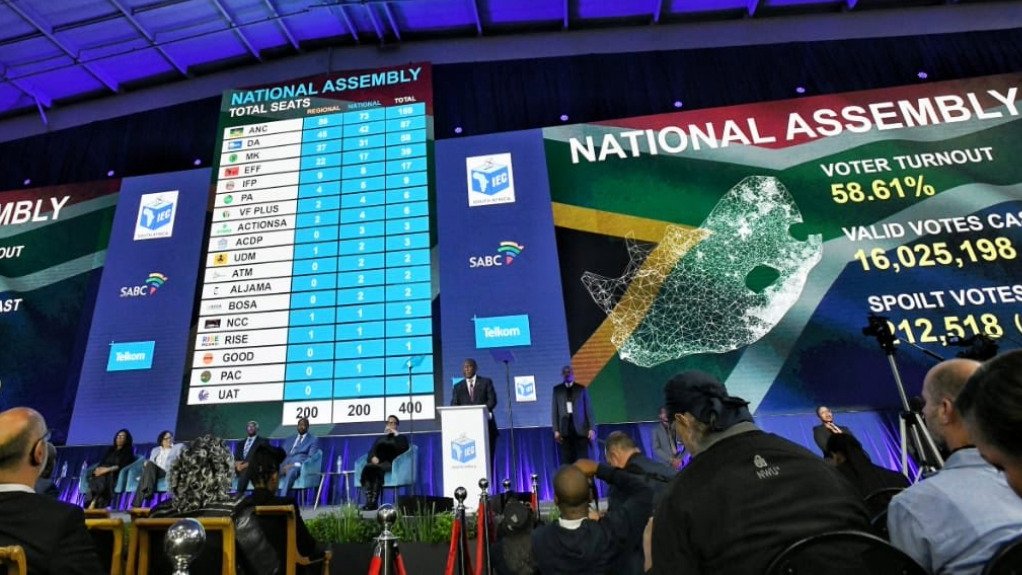Organised business has urged political leaders to accept the 2024 election results and to prioritise the crafting of stable governance arrangements underpinned by a commitment to the Constitution, as well as the economic reforms needed to support growth and job creation.
For the first time since 1994, no single party emerged from the May 29 poll with an outright majority, with the African National Congress slumping to only 40% of the vote from 57.5% in 2019.
Various governance frameworks are, thus, now being considered and negotiated, including possible coalition configurations, or agreements on ways to navigate a minority government arrangement.
However, some parties, most notably Jacob Zuma’s Umkhonto Wesizwe Party, which secured more than 14% of the national vote and about 45% of the KwaZulu-Natal provincial vote, continue to raise objections to the results, which were officially announced by the Independent Electoral Commission (IEC) on Sunday night.
Business Unity South Africa (Busa) CEO Cas Coovadia expressed concern about statements by some politicians rejecting the results, which he said had been accepted by the majority of political parties and endorsed as free and fair by domestic and international election observers.
In a statement, Busa urged all political parties to act responsibly and refrain from inciting violence that could plunge the country into unrest.
“The majority of South Africans have voted for parties that uphold the rule of law, respect the Constitution, promote inclusive growth, the independence of the South African Reserve Bank, fight corruption, and support investment and business-friendly policies.
“On the other hand, parties that promote populist policies, which we believe would undermine many of the democratic gains and exacerbate the multiple crises gripping the country, were voted for by a minority,” Coovadia said.
In his weekly letter, President Cyril Ramaphosa also urged that, as political parties sought to find each other, politicians demonstrated in their actions and utterances “that we hold the Constitution and the rule of law to be paramount”.
AT A CROSSROADS
Busa called for a coalition that would actively promote and respect the rule of law and ensure the independence of critical institutions.
“Our country is once again at a crossroads. One path leads to investment, inclusive growth, job creation and the resolution of our socioeconomic crises. The other path will deepen our crises and hamper the much-needed recovery, with the most vulnerable bearing the burden. We urge the parties that the majority of our people voted for to choose the first road,” Coovadia said.
Writing in her weekly newsletter, Business Leadership South Africa (BLSA) CEO Busi Mavuso argued that the business community was aligned with the majority of South Africans who had voted for parties committed to the Consitution, as well as safeguarding the independence of the judiciary and the reserve bank.
Meanwhile, South African Chamber of Commerce and Industry CEO Alan Mukoki said that, despite challenges, the IEC continued to execute its mandate with credibility.
Mukoki, thus, called on all political parties to “prioritise the interests of the people of South Africa first” by putting together a coalition that would take the country forward.
Mavuso also underlined the need for stability, arguing that “deals struck now must be capable of going the distance for a full five-year term”.
“We need a stable government that will continue the vital work that has already been done to put our economy on the right track to create jobs and tax revenue,” she wrote.
Any “workable plan” must also be capable of avoiding the “spectacle of votes of no confidence and repeat elections”.
BLSA also favoured deals that accepted the “policy continuity” of fiscal prudence and reform, as “we cannot afford any disruption to this momentum”.
The Operation Vulindlela reform platform created by the Presidency and the National Treasury should, thus, be “embraced and strengthened”, alongside efforts to rebuild institutions, particularly the criminal justice system.
Mavuso warned against any embrace of populism, saying this would risk destroying the momentum that had been generated around rebuilding institutions and enacting reforms that were facilitating increased investment and private participation.
“This takes time to result in improved economic performance – business confidence must be rebuilt and investors have to actually make the investment and build the capacity to take advantage of an improved environment.
“I know that we are at the beginning of that recovery, with electricity stability returning and a proactive plan to improve logistics and other network industries.
“Populism would risk once again destroying this momentum before it has been able to grow and deliver.”
EMAIL THIS ARTICLE SAVE THIS ARTICLE ARTICLE ENQUIRY
To subscribe email subscriptions@creamermedia.co.za or click here
To advertise email advertising@creamermedia.co.za or click here











